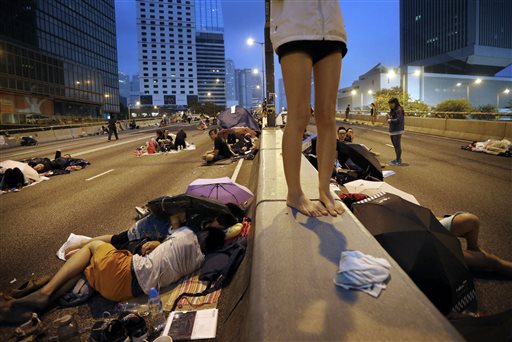Hong Kong standoff reflects wide rifts in society

Student pro-democracy protesters sleep, rest and wait on the streets near the government headquarters at the break of dawn, Sunday, Oct. 5, 2014, in Hong Kong. AP
HONG KONG — The story of Chief Executive Leung Chun-ying, Hong Kong’s top leader, is the type of rags-to-riches tale that is generally admired in this commercially-minded city. But Leung is deeply unpopular, thanks mainly to his longstanding ties with mainland China.
Beijing’s burgeoning influence in this former British colony is a key factor driving protests that have paralyzed parts of this dynamic city and brought on some of the worst confrontations in decades. Anger toward Beijing is not shared by all in Hong Kong, and the scuffles that began Friday between protesters and people trying to force them off the streets reflect widening rifts within this city of 7 million.
Protesters and their supporters have turned out by the tens of thousands at times over the past week to voice their disapproval of Leung and of plans that would require a pro-Beijing committee to screen the nomination for Hong Kong’s inaugural election for chief executive in 2017. The protests pose the biggest challenge to the mainland since it took control in 1997 under a “one country, two systems” arrangement keeping in place the city’s civil liberties and separate legal and political systems.
“We are not seeking revolution. We just want democracy,” Joshua Wong, a 17-year-old student organizer, told a huge, youthful crowd Saturday night as they cheered and chanted “Go Hong Kong!” and “Democracy Now!”
The dissatisfaction that sparked the protests extends well beyond unhappiness with Leung and political reforms. Incomes have stagnated while living costs have soared. Hong Kong’s wealth gap is one of the world’s highest, while average incomes among those under age 24 are less than 8,000 Hong Kong dollars (about $1,000) a month.
Article continues after this advertisementMany in Hong Kong believe Leung has failed to deliver on promises to raise salaries and help bring housing prices under control, and didn’t stand up for local interests against Beijing.
Article continues after this advertisement“The ‘one country, two systems’ model and high degree of autonomy, these promises have been adulterated in the past several years,” said Willy Lam, a politics professor at the Chinese University of Hong Kong.
Interviews with people involved in or watching the protests showed differing opinions. Some who moved to the city from mainland China sympathize with Beijing. But many others fled the Communist government and fret that Hong Kong’s Western-style freedoms and democratic aspirations are being eroded by increasing Chinese influence over the media and the economy.
“It is quite apparent to everyone that the chief executive has no credibility,” said Anson Chan, a widely respected former chief secretary — Hong Kong’s top civil service post. Chan said the independence of the judiciary, the rule of law and the rights and freedoms that were guaranteed by the agreements governing China’s takeover of the city were “rapidly disintegrating in front of our eyes.”
“What is at stake is our core values and our way of life,” Chan said in an interview in London.
Leung, better known as “CY” among Hong Kongers, sought to defuse the tensions by proposing talks between his government and the protesters. But the activists shelved the plan after they were attacked, accusing the authorities of colluding with criminal gangs to try to drive them away — a charge officials denied.
As a member of the top-level Chinese People’s Political Consultative Conference advisory body and other mainland-related groups, Leung participated in drafting Hong Kong’s “Basic Law,” the city’s mini-constitution.
The son of a policeman, he went to Britain after finishing college in Hong Kong and studied to become a property surveyor. After returning home, he worked in real estate, playing a key role in the sale of land use rights that are the lifeblood of most government revenues. He is not ultra-wealthy, but his spacious home atop Hong Kong’s Victoria Peak attests to his success.
With such a background and despite his humble roots, Leung is seen as one of the many Hong Kong businessmen who have profited mightily from their ties to mainland China.
“In the final analysis, what we need is for Beijing to trust the people of Hong Kong,” Chan, the former chief secretary, said.
“If you give us ‘one-man, one-vote,’ I am absolutely certain that we will use that vote very responsibly,” he said. “We will elect a chief executive who can definitely work with Beijing but who will at the same time be seen in the eyes of the community to be speaking on Hong Kong’s behalf. We don’t see this in the current chief executive.”
RELATED STORIES
Thugs disrupt Hong Kong protest
Hong Kong protesters cancel talks after scuffles